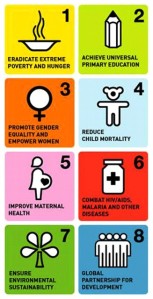By Rosa Brown
The International Development Secretary Priti Patel is not one to shy away from controversy. However, last month Patel appears to have outdone herself as she revealed her desire to use the UK’s aid budget for post-Brexit trade deals. In an interview with the BBC, Patel asserted that “We have to make sure that our aid works in our national interest and also that it works for our taxpayers – much more openness, much more transparency and much more accountability.” 
Patel’s vision for the Department for International Development (DfID) would be concerning had it belonged to any public official. But coming from the current International Development Secretary, it sounds ill-conceived at best. To insert the taxpayer at the heart of DfID’s objectives completely neglects the countries, communities and individuals reliant on UK funding. These are the people Patel should be talking about, many of whom have been empowered by the inter-governmental organisations supported by the aid budget.
The UK’s position on the world’s stage is recognised by Patel but used to justify her take on aid, “we have a strong footprint overseas and it is right that we use that footprint in the national interest”.
Whether the UK will have such a ‘strong footprint overseas’ if Patel gets her way is questionable to say the least. Patel’s crackdown on inefficient use of public money has also inspired the MP to claim that her department should no longer support the UN’s cultural body, UNESCO. This recent move earnt the MP a ‘major rap on the knuckles’ from No 10, according to a senior government official who spoke to The Sun newspaper last week.
Whilst some have wondered whether Patel’s sole objective is to make the UK appear greedy and cruel, I think she is genuinely convinced that free trade agreements are the answer to economic prosperity for the UK. But for poor countries, free trade agreements have been found to drive economies into deeper poverty. It has been over twenty years since the Northern American Free Trade Agreement (NAFTA) was enacted between the United States, Canada and Mexico. Since the agreement, Mexico’s annual per capital growth flat-lined to an average of 1.2 percent, which happens to be one of the lowest rates in the hemisphere. Twenty million Mexicans currently live in ‘food poverty’, with twenty five percent of the population unable to access basic food. This increase in poverty in the country has helped nurture organised crime recruitment and the breakdown of local communities.
Not all of Mexico’s problems can be blamed on NAFTA. But it is possible to trace a direct link between the agreement and the country’s declining economy; as NAFTA was responsible for closing alternative development paths for the economy in its prohibition of protective tariffs. The impact of NAFTA upon Mexico’s economy indicates the dangers caused by the removal of such tariffs, along with the fact that these agreements are rarely ever ‘free’.
The implications of Patel’s comments on the international aid budget cannot be detached from its post-Brexit context. These comments have come at a time when many political agreements relating to the EU are riddled with uncertainty. Now Patel has used the topic of Brexit trade agreements as a topical soundbite to deliver her stress on ‘value for money’ for the ‘good, hardworking, British taxpayer’. But this is a time when it is more important than ever to look outward rather than in, to work with others, to help others, rather than simply act upon British vested interests.
International development is not currently devolved in Wales. However the National Assembly has asserted its desire to engage in international issues, one shining example of which is the Wales for Africa Programme, launched to work in line with the United Nation’s Millennium Development Goals. Now on the tenth anniversary of the programme, is an opportunity for the nation to celebrate Wales for Africa’s successes, but also look to the future to the work that can be done.
On the subject of the Wales for African Programme, Archbishop Desmond Tutu said that the “people in Wales have big hearts. They belong in a small country but, oh man, they really have the kick of a mule!”. Now is the time to nurture our country’s commitment to international development and continue to empower those in poverty. Not for the sake of ‘strong footprints overseas’ but because it is simply the right thing to do.



